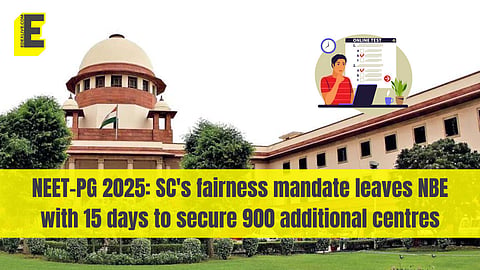

The Supreme Court's directive from today, May 30, ordering the National Board of Examination (NBE) to conduct the National Eligibility-cum-Entrance Test-Post Graduate (NEET-PG) 2025 in a single shift has set off a logistical scramble.
While medical aspirants celebrate the end of what they called a "luck-based" two-shift system, the NBE now faces the herculean task of restructuring the examination infrastructure with just 15 days remaining before the scheduled June 15 date.
What began as a fight for fairness has evolved into a race against time that could determine whether merit-based selection can coexist with structural limitations.
The scale of the challenge is staggering. The NBE must now secure approximately 900 additional examination centers to accommodate all candidates in a single session, a requirement that industry experts believe is virtually impossible.
Dr Dhruv Chauhan, National Spokesperson for the Indian Medical Association - Junior Doctors' Network (IMA-JDN), is unequivocal about the implications: the examination will likely be postponed to early or mid-August, reflecting on last year's scheduling delays.
The technical hurdles extend far beyond simply finding venues. Coordination with Tata Consultancy Services (TCS), the testing service provider, presents its own complexities, as they typically require four to six weeks to organise examinations of this magnitude.
The logistical overhaul encompasses from identifying and vetting new venues to deploying thousands of additional invigilators, recalibrating security protocols, and updating candidate allocation lists across hundreds of centers nationwide.
This infrastructure challenge becomes particularly difficult when considering the examination's growth.
While the NBE successfully conducted single shift NEET PG examinations in years prior to 2024, the dramatic increase in candidate numbers has fundamentally altered the trajectory.
Dr Khyati from Government Medical College, Maharashtra, points to this, noting that while the examining body previously managed single session exams, the current scale presents unprecedented challenges that the existing infrastructure struggles to accommodate.
The Supreme Court's confidence in India's technological advancement and infrastructure capabilities now faces a practical test.
The integrity and quality concerns surrounding this hasty restructuring cannot be understated.
Dr Vivek Pandey, social and medical activist, highlights the delicate balance required, "to protect exam integrity, NBE must use trusted centers like TCS iON and AICTE affiliated institutes, ensuring CCTV surveillance and trained invigilators. However, scaling up may strain logistics, risking seating issues, poor invigilation, and potential unfairness."
The pressure to rapidly identify 900 additional centers raises troubling questions about quality control.
The sudden requirement could force the NBE into partnerships with subpar institutions or temporary venues that lack the infrastructure, security systems, and trained personnel necessary for a high stakes national examination.
The ripple effects of potential delays extend far beyond the examination itself. Medical education follows a carefully orchestrated timeline where NEET PG results determine postgraduate admissions, which in turn affect hospital staffing, residency programs, and ultimately healthcare delivery across the country.
A postponement to August would create a cascading delay that could disrupt the entire medical education calendar, affecting thousands of careers and potentially impacting healthcare services.
The current crisis also exposes broader questions about India's examination infrastructure planning. The NBE's shift to a two session format was not arbitrary, but reflected genuine constraints in available facilities and technological capacity.
The court's rejection of these practical limitations, while legally sound in pursuing fairness, creates an implementation challenge that tests the boundaries of what can be accomplished through judicial mandate.
The resolution of this crisis will likely determine not only the immediate fate of NEET PG 2025 but also establish precedents for how India balances judicial demands for fairness with the practical realities of conducting mass examinations.
The coming weeks will reveal whether India's examination infrastructure can rise to meet the Supreme Court's expectations. For the thousands of medical graduates awaiting their career defining examination, the answer cannot come soon enough.
